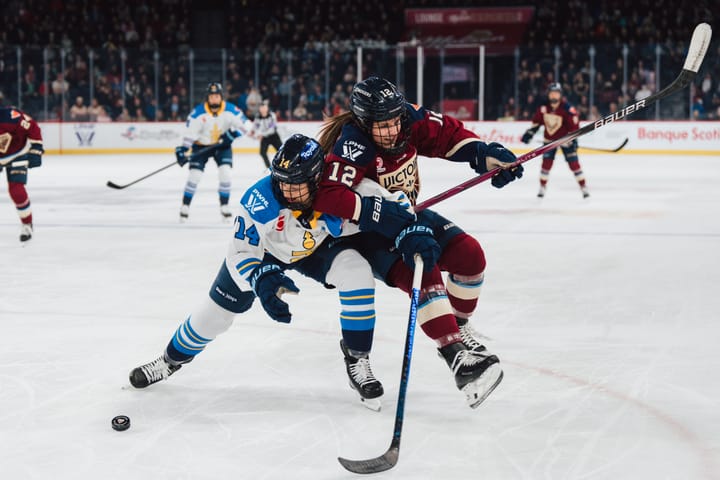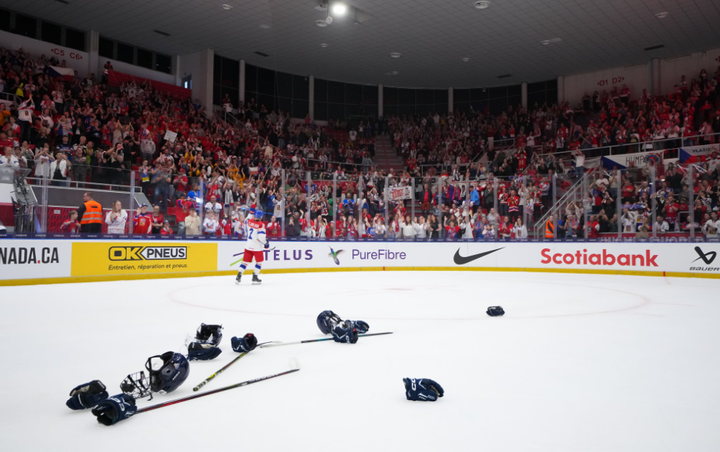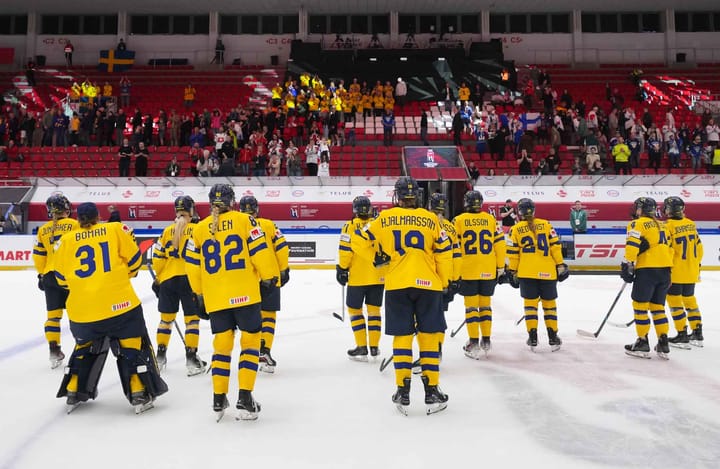The best team to never win a Division I national championship
The 2015-16 Boston College Eagles, who went 40-1-0, are the best team to never win a title.
Across all of SBNation this week, sites will be looking at the best teams to never win a championship.
We’ve seen several great teams over the years in NCAA Division I women’s hockey. Four of those teams—Clarkson, Minnesota, Minnesota Duluth, and Wisconsin—have won it all, winning a combined 19 national titles between them.
That leaves quite a few programs that have never won a title, though. You could take your pick of several and make a convincing argument that they had what it takes to win it all.
I’ve been pulling my hair out trying to write this piece for about a week now because, to me, there are two clear-cut frontrunners for the honor of “Best Team to Never Win a Championship”. And the margin between them is razor thin. Microscopic, even. But I’ve finally decided.
The best Division I women’s hockey team to not win a national championship is the 2015-16 Boston College Eagles.
(Author’s note: If you’re, say, a fan of a school that is serious rivals with BC, or you’re for some other reason unhappy with this choice, feel free to scroll to the end, where I talk about my runner-up team. Unless you’re a BU fan. If you’re a BU fan, I can’t say you’re going to enjoy the end of this post any more than the beginning or middle, and you should probably just go and watch highlights of Sammy Davis’ Beanpot winner or something.)
The wins
The 15-16 Eagles went 40-1-0, posting the second-best winning percentage in history. Literally the only thing this team didn’t do was win the national title (which is very heartbreaking and I’m sorry to even bring it up). But they’re the only other team, besides the 2012-13 Minnesota Gophers, to win 40 games in a single season. They were one of only two teams in history that even had a chance at a perfect season going into the title game, which is remarkable.
In the regular season, Boston College went 34-0-0. They faced off four times against top-five-ish-ranked Northeastern and 50-goal scorer Kendall Coyne and came out on the right end of those games on all four occasions. In the playoffs, they swept Maine in the quarterfinals, defeated UConn in the semifinals, and ran over Boston University, 5-0, to win the Hockey East championship.
They entered the NCAA Tournament as the No. 1 overall seed, the first-ever team from Boston College to do so. The Eagles faced off against conference foe Northeastern again and notched a 5-1 win to advance. They took a 1-0 lead in the first minute of the game and did not let up, scoring four more before the Huskies finally got on the board with under two minutes remaining.
To that point, BC was 0-5 at the Frozen Four in the past. But this was the squad that finally broke through for the Eagles. They did it in thrilling fashion, with a 3-2 overtime win against Clarkson in the national semifinal. A slightly ridiculous stat: the Golden Knights took a 1-0 lead into the first intermission, marking the first time all season that Boston College trailed after a period of play.
Still, the Eagles came back from 2-0 deficit and Haley Skarupa notched the winner in overtime.
The players
BC was led by an all-star cast in that 2015-16 season, and they did not disappoint. Alex Carpenter led the country with 88 points; Haley Skarupa was third with 79 points. Both players also ranked in the top-three in points per game.
The Eagles had four other players who ranked in the top-20 nationally in scoring: sophomore defender Megan Keller, freshman forward Makenna Newkirk, senior forward Dana Trivigno, and sophomore forward Kenzie Kent. Katie Burt was their goaltender. Their supporting cast, of forwards Andie Anastos, Kristyn Capizzano, and Tori Sullivan and defenders Lexi Bender, Toni Ann Miano, Kali Flanagan, and Kaliya Johnson, was not half-bad either.
Carpenter finished as a Patty Kazmaier Memorial Award Top-3 Finalist after winning the award the year prior. Keller and Skarupa joined her as Top-10 Finalists.
Together, Boston College was nothing short of dominant that season. They outscored opponents by an average of 3.95 goals per game and outshot them by an average of 21.95 shots on goal per game. Their power played clicked at 29.4%; their PK killed off 91.6% of chances. Their 43.17 shots on goal per game led the country.
How they stack up
Historically, this BC squad was one of the most dominant of all time. They scored the fourth-most goals in a single season in NCAA history with 213, just three behind that perfect 2012-13 Minnesota team. Combined, their offense scored more points (592) than any other team in history.
Their scoring margin per game, of 3.95, also ranks fourth all-time. And their winning percentage, of .976, ranks second. They are one of just two one-loss teams, along with the 2006-07 Wisconsin Badgers.
Unfortunately, after all that dominance, this team came up short of their ultimate goal: winning a national championship. Minnesota defeated BC, 3-1, in the title game to spoil the program’s best chance at winning. The Eagles haven’t advanced that far again since. Regardless, it’s hard to ignore everything this team did achieve before that final game.
We only have one perfect team in NCAA Division I history, but that Eagles squad is the closest we’ve come to a second.
The runners-up
There’s probably some debate to be had about the second-best team to never win a championship. To me, though, the choice is clear: the 2011-12 Cornell Big Red.
This was an exceptional team, and if it weren’t for BC’s record-setting, historic dominance in 2015-16, I’d be very easily swayed to name the Big Red the winners here. They were a firm No. 3 in the polls for practically the entire season. Their roster was headlined by Rebecca Johnston, Brianne Jenner, Jill Saulnier, Catherine White, Laura Fortino, and Chelsea Karpenko—all players who scored a point per game or better. Lauriane Rougeau, Hayleigh Cudmore, and Alyssa Gagliardi also featured heavily on the blue line.
Cornell came very close to winning a championship that year. They defeated a super-talented top-five Boston University squad in triple overtime in the NCAA quarterfinals to advance to the Frozen Four. Unfortunately, they ran into the Gophers there, who were at that point just getting warmed up for their undefeated season. Minnesota’s record 62-game winning streak was well under way by then, and the Gophers won that semifinal by a score of 3-1 en route to the 2012 national championship.





Comments ()